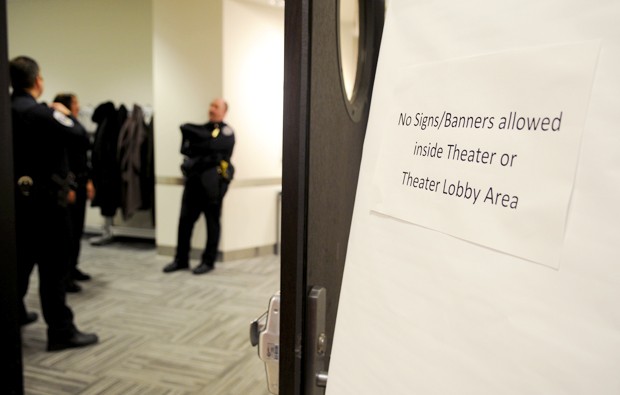As people filed into Coffman UnionâÄôs Theater to hear University of Minnesota President Bob BruininkâÄôs State of the University Address Thursday, about 25 University staff gathered outside the entrance with signs to protest proposed cuts to the Regents Scholarship Program. In an e-mail sent Sunday, Bruininks laid out a proposal intended to save $2.5 million by changing the Regents Scholarship, which was launched in 1966 and covers 2,300 employees. Currently, employees at the University who work at least 30 hours a week have the cost of their tuition covered through the scholarship. With BruininkâÄôs proposed changes, employees would be required to cover 25 percent of their tuition costs. The rest would still be paid for by the University. After his address, Bruininks answered questions that had been e-mailed in before and during his speech. Of the 60 questions e-mailed, 30 had to do with the proposed changes to the scholarship. âÄúThis is a tough one for the Regents and the administration,âÄù Bruininks said. âÄúI think itâÄôs one of the best benefits we provide students.âÄù Cherrene Horazuk, chief steward of the American Federation of State, County and Municipal Employees Local 3800 clerical workers, said cuts in the scholarship could limit some University employeesâÄô ability to pursue a degree while working. âÄúMany of our members are working towards their degrees and this will make it impossible for us to do so,âÄù she said. Horazuk, who works at the Hubert H. Humphrey Institute for Public Affairs, also expressed concern that the changes to the scholarship will disproportionately affect AFSCME workers because many didnâÄôt have degrees when they started working at the University, but are able to pursue one through the program. âÄúFaculty clearly already have a degree. Professional employees, most of them have degrees,âÄù she said. âÄúThe people that are going to be affected the most are us.âÄù The Regents Scholarship is a big benefit to employees and a major reason many chose to take a job at the University, Jennifer Schulz, a worker in the Office of International Programs, said. âÄúItâÄôs a huge incentive to come work here,âÄù she said. âÄúThe salaries, we all know, arenâÄôt going to be as high as they are in the private sector, and this is a way of making up for that.âÄù Schulz, who is applying to take classes at the Humprhey Institute of Public Affairs, said that even with the University covering 75 percent of tuition costs, she would still end up paying $10,000 for her courses. âÄúIf they cut it [the scholarship], itâÄôs too expensive for us to handle,âÄù she said. âÄúI think a lot of people count on the scholarship and a lot of people will have to reconsider their education because of this.âÄù University spokesman Dan Wolter called the scholarship âÄúan important tool in recruitment,âÄù but said with the budget cuts the University is facing, cuts are being made across the board. Even with employees being responsible for 25 percent of their tuition, Wolter said the scholarship is still âÄúa significant benefitâÄù and that the alternative is jobs being cut. âÄúThrough the hiring pause weâÄôve put in place, the salary freeze for senior executives, weâÄôre taking a variety of steps to control costs so we donâÄôt have to do mass layoffs as a result of budget costs,âÄù Wolter said. The program currently costs the University $9 million a year to operate and has been growing at a rate of about 10 percent a year, Bruininks said. The proposed changes would save $2.5 million, which equates to about 40 jobs at the University of Minnesota, Bruininks said. He called the cuts âÄúa reasonable thing to doâÄù in the face of budget problems. âÄúIâÄôd rather not make this decision,âÄù he said. âÄúIâÄôd rather not make the dozens of the decisions that we have to make to balance this budget. This is the deepest budget reduction the University has experienced or likely to experience in the foreseeable future.âÄù Any other âÄúcreative solution that protects peopleâÄù would be considered, Bruininks said.

Image by Matt Mead
A sign outside of Coffman Memorial Union’s theater warns not to bring in signs during University of Minnesota Bob Bruininks’ State of the University address on Thursday.
U staff protest proposed changes to scholarship
Under a change to the Regents Scholarship Program, University employees would no longer receive free tuition.
Published March 5, 2009
0

